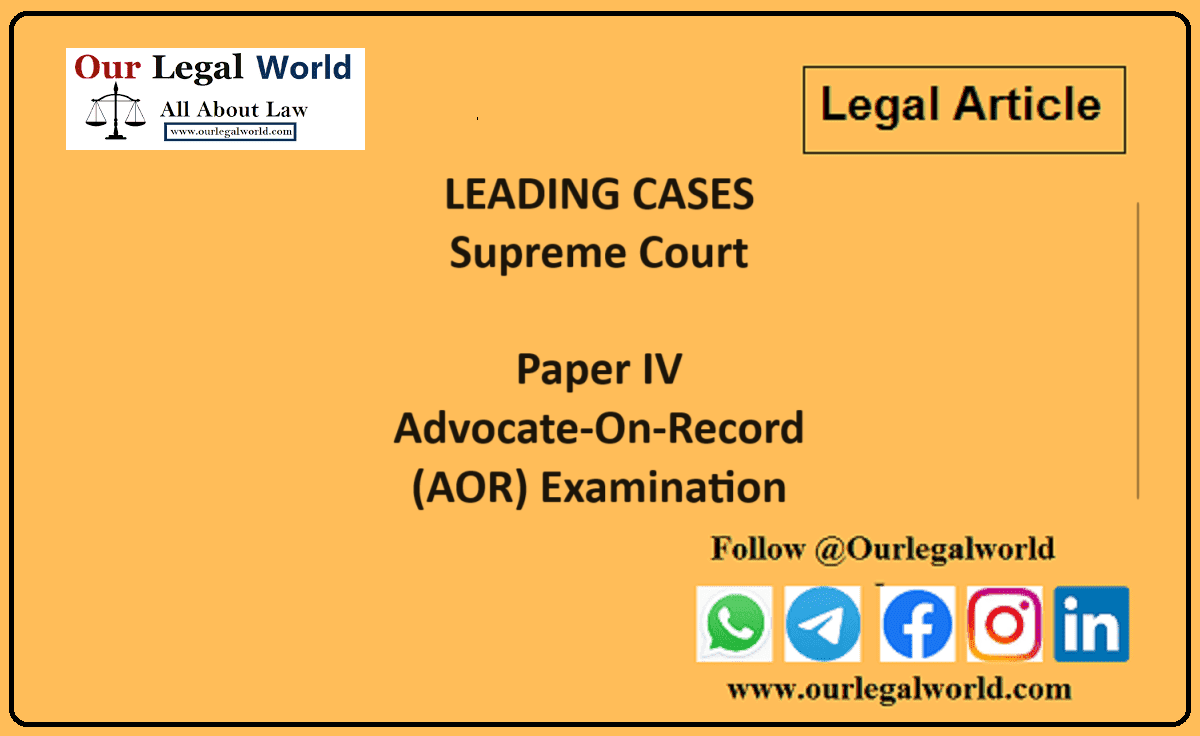REGISTRATION OF MARRIAGE UNDER HINDU LAW
INTRODUCTION
Registration of marriage is not compulsory in all countries. However, most of countries recognize the need for such registration. Registration of marriage can be provided as evidence before the court of law whenever required. In India, Hindu Marriages are legally registered under Section 8 of Hindu Marriage Act, 1955. After the solemnization of marriage, the parties are required to register the marriage to provide written proof or to prove it that the marriage has been legally existing. If a marriage is unregistered it is not treated as void but is punishable with small fine.
The main purpose of the registration of marriage is to preserve a record of marriage. The persons who are citizens of India belonging to various religions should compulsorily register their marriages in the states where the marriage is solemnized, the compulsory registration of marriage would be a step in the right direction for the prevention of child marriages prevailing in certain parts of the country [1].
Who can Register a Marriage under Hindu Marriage Act, 1955
According to Section 2 of the Hindu Marriage Act 1955, all those persons who are Hindu, Jain, Buddha, or Sikh by religion and those who convert and reconvert to Hinduism including (Buddhists, Jains, Sikhs) come under the Hindu Marriage Act, 1955 and they all are eligible to register marriage under this act.
Essential Conditions in Registration of Hindu Marriages
The essential conditions of a valid Hindu Marriage is defined under Section 5 and Section 7 of the Hindu Marriage Act, 1955 and Section 8 of the act deals with the registration of marriages. If a marriage is solemnized by the essential conditions and existing valid customs it can be registered. The Hindu Marriage Act only deals with the registration of marriage that has already been solemnized. The registration itself does not make a marriage valid, it is the solemnization thereof which brings about marriage. The mere registration of an agreement of a marriage is not sufficient to prove marriage [2].
Also Read: Difference/ Distinction between Arrest and Custody?
Section 8 of Hindu Marriage Act, 1955
Section 8 of the Hindu Marriage Act, 1955 lays down the registration of marriages. Section 8(1) of the act empowers the State Government to make rules for the purpose of registration of marriages. The State Governments can make the registration of marriages compulsory but they cannot make any provision invalidating the marriages as it is against the Sub-section 5 of the act. Different state governments have passed laws for compulsory registration of marriages. For instance, The Kerala Registration of Marriages (Common) Rules, 2008, provides that all Marriages solemnized in the State shall compulsorily be registered irrespective of religion of the parties [3].
Section 8(2) of the act provides that a Hindu Marriage shall be compulsorily registered if the State Governments have made rules regarding them. The State Governments are also give an option to make rules and conditions for registering the marriages in a register called Hindu Marriage Register. Different state governments have enacted rules regarding registration. The Supreme Court held in Seema v. Ashwani Kumar that the marriage should be registered in the State, where the marriage is solemnized and consequently, no rule or form could stipulate terms contrary to the said binding position of law.
Section 8(3) of the act states that all such rules made by the State Governments regarding marriage registration shall be laid before the State Legislature to give them legal status.
Section 8(4) of the act states that the Hindu Marriage Register is a public record and it should be open for inspection at all reasonable times (allowing anyone to obtain proof of marriage), therefore on application it shall be given by the Registrar on payment to him of the prescribed fee. Also it should be admissible as evidence in a court of law. The Registrar of Marriage is bound to record the divorce in the register maintained by him on a divorce ordered by a court [4].
Section 8(5) of the act lays down that any omission to make any entry in the marriage register shall in no way affect its validity.
Procedure Of Marriage Registration
For the purpose of registration of marriage, one has to approach the office of the Sub Divisional Magistrate under whose jurisdiction the marriage took place or where either of the spouses stayed for at least six months before the marriage. After the verification of all documents is done, a date is fixed and communicated to the parties for registration. On the appointed day, both parties along with a Gazetted Officer who attended their marriage, need to be present before the Sub Divisional Magistrate. The Marriage certificate is also issued on the same day.
Effect Of Non-Registration and Registration Of Marriage
The effect of non-registration of marriage by any person after the enforcement of Section 8 of Hindu Marriage Act, 1955 is that it would be punishable with fine which may extend to Rs.25/-. Both the spouses will be liable for punishment if the entries are not made. If only one of the spouses had made the entries the other spouse will not be liable for punishment.
The effect of registration of marriage is that foreign embassies or consulates grants visa to spouses who have marriage certificate as a proof. In cases like legal separation, divorce, alimony or custody of children the courts may insist on seeing marriage certificates so it is useful as an evidence.
Also Read: Arbitration and Conciliation Act, 1996 : Power and Function of Arbitration
CONCLUSION
Registering one’s marriage is now common among Indian couples today than in earlier days. But it is still not a norm to many couples. Our country does not values marriage certificates because our culture has a vast number of rituals. These rituals varies from place to place and from family to families. Even the Hindu Marriage Act 1955, recognizes customary or ritualistic marriages as legitimate. If customary or ritualistic marriages are not registered with a state body, it becomes tougher for spouses.
The Law Commission’s Report of July 2017, to the law ministry recommends to make marriage registration compulsory for couples of all communities across the country within 30 days of the wedding, proposing a fine of Rs. 5 per day for any delays after that [5]. The National Commission for Women has pointed out that registration of marriage has critical importance to various women-related issues, such as the prevention of child marriage, bigamy, maintenance to wives etc. It is explicitly laid down in the Act that non-registration does not affect the validity of marriage, thus marriage can be valid without registration.
REFERENCES
1. Seema v. Ashwani Kumar, 2006 TP (C) 291/2005
2. Rathnamma v. Sujathamma, 2019
3. Kerala Registration of Marriages (Common) Rules, 2008
4. K.R Sinimol v. The Local Registrar of Marriages (Common), 2018
5. 270th Report of Law Commission of India, July 2017
Edited By- Ankita Roy








![Tax Law Internship at Legum Attorney [Chamber of Ashish Panday], Delhi : Apply by 15th May 2025](https://www.ourlegalworld.com/wp-content/uploads/2025/05/IMG_0113-min.png)
